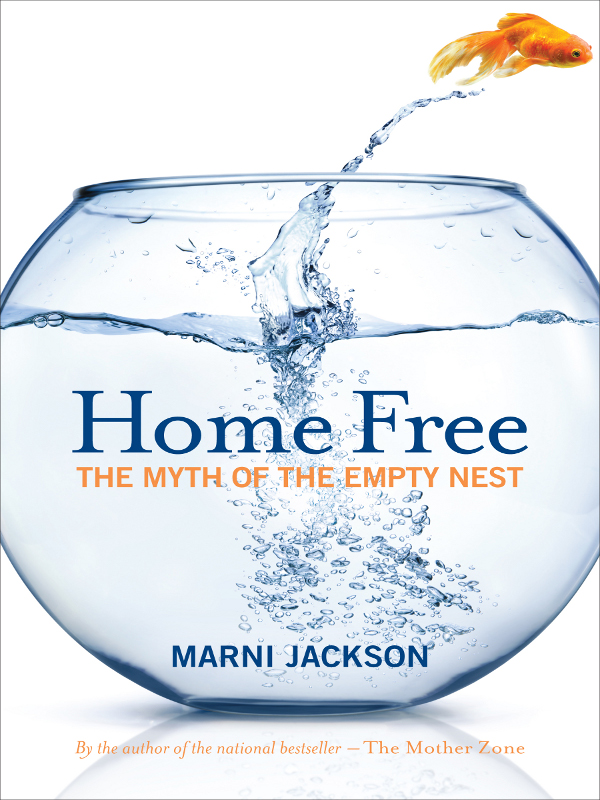Home Free



ALSO BY MARNI JACKSON
The Mother Zone
Pain: The Fifth Vital Sign
Home Free
The Myth of the Empty Nest
Marni Jackson
THOMAS ALLEN PUBLISHERS
TORONTO
Copyright © 2010 Marni Jackson
All rights reserved. No part of this work may be reproduced or transmitted in any form or by any meansâgraphic, electronic, or mechanical, including photocopying, recording, taping, or information storage and retrieval systemsâwithout the prior written permission of the publisher, or in the case of photocopying or other reprographic copying, a licence from the Canadian Copyright Licensing Agency.
Library and Archives Canada Cataloguing in Publication
Jackson, Marni
     Home free : the myth of the empty nest / Marni Jackson.
ISBN 978-0-88762-616-6
1. Parent and adult child. Â Â Â 2. Jackson, Marni. Â Â Â I. Title.
HQ755
.86.J32 2010 Â Â Â 306.874 Â Â Â C2010-903801-0
Editor: Patrick Crean
Cover design: Sputnik Design Partners Inc.
Cover image: Shutterstock
Published by Thomas Allen Publishers,
a division of Thomas Allen & Son Limited,
145 Front Street East, Suite 209,
Toronto, Ontario M5A 1E3 Canada

The publisher gratefully acknowledges the support of
The Ontario Arts Council for its publishing program.
We acknowledge the support of the Canada Council for the Arts, which last year invested $20.1 million in writing and publishing throughout Canada.
We acknowledge the Government of Ontario through the Ontario Media Development Corporation's Ontario Book Initiative.
We acknowledge the financial support of the Government of Canada through the Canada Book Fund (CBF) for our publishing activities.
1 2 3 4 5 Â Â Â 14 13 12 11 10
Printed and bound in Canada
for Olive and Lola
You can't be twenty on Sugar Mountain
Though you're thinking that
You're leavin' there too soon.
âNeil Young            Â
Contents
The Generation Gap vs. The Friendly Parent
Home Free
I
T'S A HUMID SPRING DAY, and my 26-year-old son has just biked across town, from the apartment he shares with some friends, to tackle a strange chore. He's sitting at the table in our kitchen, reading the last few chapters of this book, which tells the story of our family from the time he left home at 18 to go to college in Montreal to last year, when he moved back to Toronto. I am nervous; I have no idea whether my version of things will square with his.
I don't expect him to be enthralled. It's bad enough getting a string of emails from your mother about job prospects without having to read an entire book written by your mother, about being a mother.
So I have to distract myself while he reads, pen in hand. I go upstairs and decide to throw out all our expired prescription drugs. That takes five minutes. I check my email and sign a few online petitions. I look out my office window and see Casey down below. He's moved out to the table on the patio. He's turning the pages, making a note now and then. From this angle I can't tell if he looks annoyed or just neutral. The suspense is driving me crazy.
We've been through this process before, with him reading the stories I've written about our family, getting backstage glimpses of me as mother. I have writerly tricks, but if I am not telling the truth he will be the first to detect this. At the same time, I need to stand up for how I see things, too. How it felt for me when he left home, went off to school, dropped out, roamed around Mexico, came back . . . how the three of us have negotiated the ongoing shifting of our roles.
His response to this project has been patient, and his advice has been useful. “Just be true to your own experience of things,” he said,“and don't confuse that with who I am.”
The other editorial insight he gave me was this: “You can't be mothering in the writing.” In other words, I have to resist the urge to protect him, to fluff his résumé, in the stories I tell. The desire I have to make him (and us) look good immediately gums up the narrative and turns the writing soft. I can't protect and reveal at the same time.
Writing is the opposite of mothering.
By craning my neck almost out my office window I can see that he is on the last page. I whip downstairs. He is genial, relaxed, smiling.
“No big problems here,” he says, all business. “Just a couple things. Otherwise, good.”
I sit down. He thinks I have been fair in my portrayal of our fight at the cottage.
“Maybe take out the phrase âcold blue eyes'; it makes me sound like a psychopath. And in the chapter when I move back to Toronto, you need to indicate that the tone has changed and I'm not angry.” I make notes. I am impressed. His response to this book about how kids in their twenties are taking their time to grow up and leave home is remarkably mature. Clearly, it's time to stop writing.
In most family memoirs, it's traditionally the children who blow the whistle on their parents. Mothers who write fretful magazine articles about their son's online gambling or fathers who publish books about what it's like to live with an autistic child are new. It's clear that the protective silence that used to surround the family has been breached. (In England, Julie Myerson caused a stir with her memoir
The Lost Child
, about her difficult, dope-smoking son. He claims he is not the grim addict she portrays, has publicly called his mother “insane,” and hates the book.)
My family is a little offbeat, shall we say, but blessedly free of genuine damage or affliction. No one is in rehab or small-claims court as I write this. I'm only talking about the ordinary anguish of raising normal children in this bookâparticularly the twilight stage, when they leave home, then come back, then leave again.
I wrote my first book,
The Mother Zone
, after having my first (and only) child at the age of 37. I am a bit astonished at my own candour, now that I riffle through it again. My son grew up from birth to the age of eight in the course of the book, and all I had to do was read him the relevant passages and remove one or two that involved bodily functions to acquire his permission to go public. It was obvious to him that writing books was a silly activity, and less fun than drawing.
As for my husband, luckily he is a writer and film critic, someone who understands the exigencies of storytelling. He didn't mind playing a role in my version of things, even when it wasn't always flattering. A good story, like a long marriage, has to have some conflict.
The Mother Zone
was published in 1992, when parenting was still a non-subject. The lusty outback of mothers who blog did not existânor did the word “blog”âand my notion that the interior life of a mother was a compelling and unexplored topic was not yet shared by publishers. Still, it felt like a book I had to write.
Eighteen years later, I am surprised to find that it is being read by a new generation of women, as if nothing has changed. Well, that's not true; strollers have evolved. Now they have cup holders, if not GPS. But I'm convinced that despite the new visibilityâin-escapability, some would sayâof the subject, motherhood will always ambush women. It's the great unraveller.
This is because we keep making up new rules to mask the truth of parenthood, which is that raising children is a bottomless and unfixable state of being in love. We're swept along in family like a current. One moment it's exhilarating; we think we've got the hang of it. The next moment our children swirl out of sight, and we panic. Along the way, to deal with the fear of loving and losing our children, each generation creates new myths about motherhood.
For instance, there is this wistful notion that caring for kids is a temporary passage. New parents are shadowed by the expectation that they will, and should, “get back to normal” once the children (a) sleep through the night (b) eat solids (c) go off to college. But whether you embrace it or run away from it, family is forever.
One myth, which must have fuelled more than a few cases of postpartum depression and countless gin and tonics, was that all women love being mothers and are instantly good at it, thanks to a mystery hormone called “maternal instinct. ”The past two decades of women writing frankly about motherhood have put that one to rest.
More recent myths are that “all mothers are ambivalent and conflicted about their role” and “being an at-home, full-time mother is best for our kids but drives women crazy.” Young women now plunge into motherhood armed with information, ready to finesse it, like grad school or a job interview. But parenthood is not just a skill set. Nor is abundant love going to solve all the stuff that family puts in our way. Nobody anticipates the heartache that comes with the
normal
course of things, let alone life plus bad luck.
Three years ago, a publisher asked me if I would consider writing a sequel to
The Mother Zone
. “You must be joking,” I said. “My son is 24.” Then it struck me that I was in the grip of yet another myth: the empty nest. Although my son was living in another city, he was often back under our roof, and certainly never far from my thoughts. This was a new and growing suburb of the mother zone. And I knew from talking to my friends that many parents of my generation are deeply engaged, if not ensnared, in their grown kids' lives.
The moment I said to my publisher that I wasn't a card-carrying mother any more, I knew it wasn't true. As a mother, I am chronic. It's part of the job description, apparently.
Twenty percent of North American children between the ages of 18 and 29 still live with their families. Many are taking their time to find their way. Yet this is slightly embarrassing terrain for parents, our habit of staying awake until the 23-year-old son comes through the door at 3 a.m. or our delicate manoeuvrings to help a daughter snag an internship. We read articles about the listlessness of the “boomerang generation,”their entitlement and lack of direction. We don't like to consider how our overparenting may have contributed to this. Or is a long incubation period simply the new face of family?
